Hyundai i30 vs Hyundai i20 – Differences & prices compared
Compare performance, boot space, consumption and price in one view.
Find out now: which car is the better choice for you – Hyundai i30 or Hyundai i20?
The Hyundai i30 (Hatchback) comes with a Petrol or Petrol MHEV engine and Manuel or Automatic transmission. In comparison, the Hyundai i20 (Hatchback) features a Petrol MHEV or Petrol engine with Automatic or Manuel transmission.
When it comes to boot capacity, the Hyundai i30 offers 395 L, while the Hyundai i20 provides 352 L – depending on how much space you need. If you’re looking for more power, decide whether the 140 HP of the Hyundai i30 or the 100 HP of the Hyundai i20 suits your needs better.
In terms of consumption, the values are 5.70 L per 100 km for the Hyundai i30, and 5.20 L for the Hyundai i20.
Price-wise, the Hyundai i30 starts at 24000 £, while the Hyundai i20 is available from 17400 £. Compare all the details and find out which model fits your lifestyle best!
In the compact car segment, the Hyundai i20 faces stiff competition from its larger sibling, the Hyundai i30. While both models boast Hyundai's signature blend of reliability and stylish design, the i20 is tailored for urban efficiency with a cozy footprint and exceptional fuel economy. In contrast, the i30 offers a more spacious interior and a robust engine lineup, positioning it as a versatile choice for family needs and longer journeys.
Hyundai i30
The Hyundai i30 stands out in the hatchback segment with its sleek design and modern features. It offers a comfortable ride with a well-crafted interior that caters to both driver and passengers. With its emphasis on safety and technology, the i30 provides a balanced driving experience suitable for urban and suburban environments.
details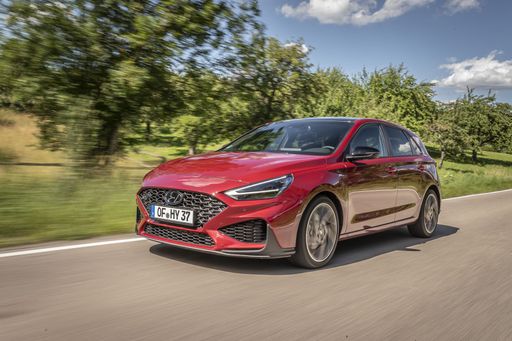 @ hyundai.news
@ hyundai.news
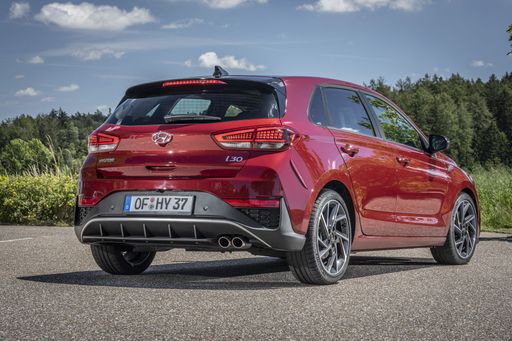 @ hyundai.news
@ hyundai.news
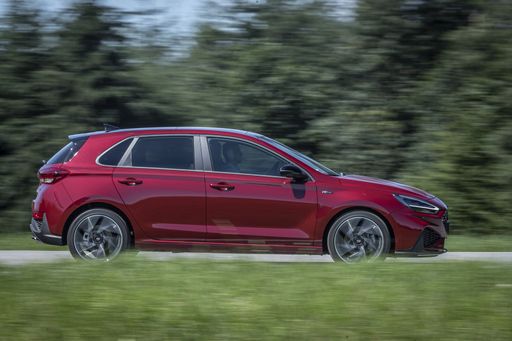 @ hyundai.news
@ hyundai.news
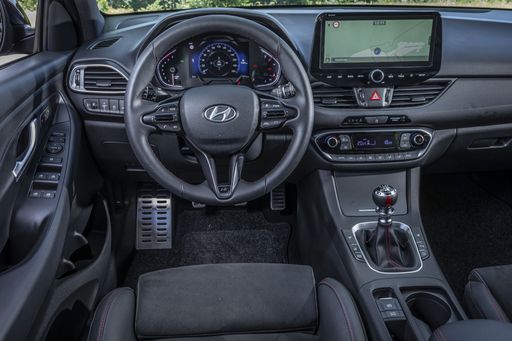 @ hyundai.news
@ hyundai.news
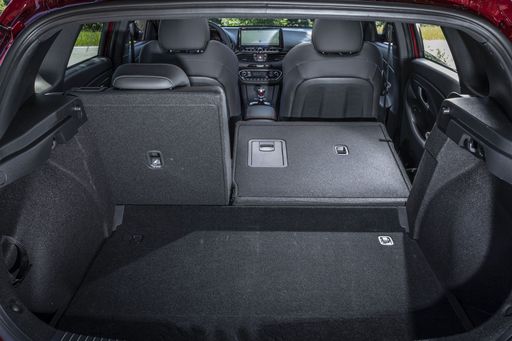 @ hyundai.news
@ hyundai.news
Hyundai i20
The Hyundai i20 impresses with its sleek design and modern aesthetics, making it a stylish choice in the compact car segment. Its interior is thoughtfully designed, offering comfort and advanced technology for a pleasurable driving experience. The vehicle also stands out with its efficient performance and agile handling, making city driving a breeze.
details @ hyundai.news
@ hyundai.news
 @ hyundai.news
@ hyundai.news
 @ hyundai.news
@ hyundai.news
 @ hyundai.news
@ hyundai.news
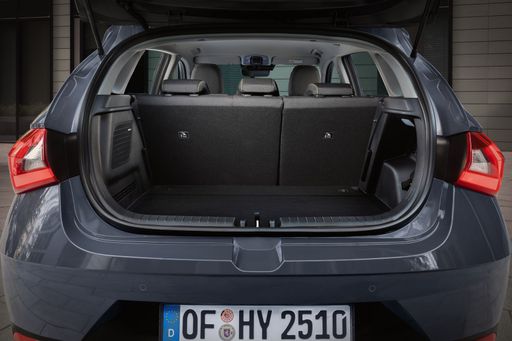 @ hyundai.news
@ hyundai.news
Compact Contenders: Hyundai i20 vs. Hyundai i30
In the compact car market, Hyundai offers two prominent contenders: the Hyundai i20 and the Hyundai i30. Each model boasts its own unique strengths, appealing to a variety of drivers. While they share the same hatchback body style, their differences in size, power, and features make them suitable for different needs. Let's dive into a detailed comparison to find out how these two models stack up against each other in the 2024 lineup.
Design and Dimensions
The Hyundai i20, with a length ranging from 4065 mm to 4075 mm, width of 1775 mm, and height standing at 1450 mm to 1455 mm, is slightly more compact than the i30. Meanwhile, the i30 extends to a length of 4340 mm, width of 1795 mm, and shares a height of 1455 mm. The extra space in the i30 translates into a more accommodating cabin, especially evident in its trunk capacity of 395 liters compared to the i20's 352 liters, making the i30 a more practical choice for those needing more storage for weekend trips.
Engine and Performance
Under the hood, both models offer multiple engine configurations. The i20 is powered by either a 998 cm³ or a 1197 cm³ engine, delivering a power output between 79 and 100 HP. Drivers can expect a fuel consumption of 5.1 to 5.3 L/100 km. With an acceleration from 0-100 km/h ranging between 11.1 and 13.7 seconds, it is designed for those prioritizing efficiency and urban usability.
Conversely, the i30 brings a bit more punch with engine options that include a 998 cm³ engine and a more powerful 1482 cm³ alternative reaching up to 140 HP. It offers a slightly higher fuel consumption ranging from 5.6 to 5.9 L/100 km, but this is well-justified with improved acceleration times as quick as 9.6 seconds from 0-100 km/h in its more powerful trim.
Transmission and Drive
Both models maintain a front-wheel drive layout. Transmission options include both manual and dual-clutch automatic options for a versatile driving experience. The dual-clutch automatic in both cars is particularly notable for smooth shifting and efficiency.
Environmental Impact
In terms of environmental performance, both the i20 and i30 fall into the CO2 efficiency class D. The i20's emissions range from 117 to 120 g/km, whereas the i30 ranges from 126 to 133 g/km. While both are environmentally conscious options, the i20 slightly edges the i30 in lower gram/kilometer emissions.
Final Considerations
Ultimately, choosing between the Hyundai i20 and i30 hinges on personal priorities. The i20 stands out for urban drivers seeking a nimble, fuel-efficient vehicle with a more compact footprint. Meanwhile, the i30 caters to those who value additional power and space, making it suitable for families or those who require a bit more room for cargo.
Both models are equipped with Hyundai's reputable engineering and innovation, ensuring reliability and modern features across the board. When it comes down to decision-making, understanding your driving needs and lifestyle will be integral in selecting the perfect hatchback companion from Hyundai's strong lineup.

|

|
|
|
|
Costs and Consumption |
|
|---|---|
|
Price
24000 - 29300 £
|
Price
17400 - 24000 £
|
|
Consumption L/100km
5.7 - 6 L
|
Consumption L/100km
5.2 - 5.3 L
|
|
Consumption kWh/100km
-
|
Consumption kWh/100km
-
|
|
Electric Range
-
|
Electric Range
-
|
|
Battery Capacity
-
|
Battery Capacity
-
|
|
co2
130 - 136 g/km
|
co2
119 - 121 g/km
|
|
Fuel tank capacity
50 L
|
Fuel tank capacity
40 L
|
Dimensions and Body |
|
|---|---|
|
Body Type
Hatchback
|
Body Type
Hatchback
|
|
Seats
5
|
Seats
5
|
|
Doors
5
|
Doors
5
|
|
Curb weight
1291 - 1407 kg
|
Curb weight
1088 - 1190 kg
|
|
Trunk capacity
395 L
|
Trunk capacity
352 L
|
|
Length
4340 mm
|
Length
4065 - 4075 mm
|
|
Width
1795 mm
|
Width
1775 mm
|
|
Height
1455 mm
|
Height
1450 - 1455 mm
|
|
Payload
463 - 509 kg
|
Payload
450 - 472 kg
|
Engine and Performance |
|
|---|---|
|
Engine Type
Petrol, Petrol MHEV
|
Engine Type
Petrol MHEV, Petrol
|
|
Transmission
Manuel, Automatic
|
Transmission
Automatic, Manuel
|
|
Transmission Detail
Manual Gearbox, Dual-Clutch Automatic
|
Transmission Detail
Dual-Clutch Automatic, Manual Gearbox
|
|
Drive Type
Front-Wheel Drive
|
Drive Type
Front-Wheel Drive
|
|
Power HP
100 - 140 HP
|
Power HP
79 - 100 HP
|
|
Acceleration 0-100km/h
9.6 - 13.1 s
|
Acceleration 0-100km/h
11.1 - 13.7 s
|
|
Max Speed
178 - 197 km/h
|
Max Speed
166 - 183 km/h
|
|
Torque
172 - 253 Nm
|
Torque
113 - 200 Nm
|
|
Number of Cylinders
3 - 4
|
Number of Cylinders
3 - 4
|
|
Power kW
74 - 103 kW
|
Power kW
58 - 74 kW
|
|
Engine capacity
998 - 1482 cm3
|
Engine capacity
998 - 1197 cm3
|
General |
|
|---|---|
|
Model Year
2024
|
Model Year
2024
|
|
CO2 Efficiency Class
D, E
|
CO2 Efficiency Class
D
|
|
Brand
Hyundai
|
Brand
Hyundai
|
Hyundai i30
Introducing the Hyundai i30: A Blend of Performance and Innovation
The Hyundai i30 continues to impress the automotive world with its fine balance of performance, efficiency, and cutting-edge technology. As a quintessential hatchback, the i30 caters to a diverse range of drivers, offering a remarkable driving experience through its impressive powertrains and compact yet stylish design.
Dynamic Performance Options
At the heart of the Hyundai i30 lies a variety of engine choices designed to suit different driving preferences. The power output ranges from 100 PS to 280 PS, allowing drivers to choose an i30 that perfectly matches their performance needs. Whether you're inclined towards the spirited drive of the N Performance variants or prefer the efficiency of the mild hybrid versions, there’s a powertrain tailored for you.
Innovative Hybrid Technology
For those seeking enhanced fuel efficiency without compromising on power, the i30’s 48V mild-hybrid system offers a compelling option. Available with both manual and automatic transmissions, this innovative technology provides an ideal balance, reducing emissions and improving fuel consumption, with an impressive average of just 5.7 L/100km.
Sophisticated Design and Features
The Hyundai i30’s sleek design is complemented by thoughtful interior features that elevate the driving experience. With a boot space ranging from 395 to 450 litres, this hatchback ensures ample room for all your luggage needs. Furthermore, the car's aesthetic appeal is matched by its practical ergonomic layout, catering to both style enthusiasts and those seeking functionality.
Advanced Safety and Technology
The i30 is equipped with an array of advanced safety features, enhancing driver confidence and ensuring passenger safety. Its cutting-edge safety suite includes lane-keeping assist, forward collision warning, and adaptive cruise control. Additionally, the i30 offers a modern infotainment system, designed to keep you connected and entertained on every journey.
Conclusion: A Versatile Choice for Modern Drivers
The Hyundai i30 is more than just a hatchback; it’s a remarkable amalgamation of power, efficiency, and modern technology. Whether you're enticed by the high-performance models or the eco-friendly mild-hybrid variants, the i30 stands out as a versatile choice that meets the demands of today’s discerning drivers.
Hyundai i20
Introducing the Hyundai i20: A Blend of Style and Efficiency
The Hyundai i20 has been a favourite in the subcompact car segment, loved for its innovative features and reliable performance. In its latest versions, the i20 continues to impress with a perfect balance of aesthetics and functionality. Below, we dive into the technical details that make the Hyundai i20 a compelling choice for modern drivers.
Powertrain and Efficiency: Where Performance Meets Economy
The Hyundai i20 lineup offers an array of engine options, ranging from a 1.0-litre T-GDI petrol engine to the energetic 1.0-litre T-GDI 48V hybrid. These engines generate between 100 PS to a remarkable 204 PS in the N Performance variant. The incorporation of a mild-hybrid system improves fuel efficiency, with consumption as low as 5.1 L/100 km.
With both automatic and manual transmissions available, drivers can enjoy crisp gear shifts and a smooth driving experience. Front-wheel drive ensures nimble handling, making city and motorway drives equally enjoyable.
Design: Compact in Form, Grand in Appearance
The Hyundai i20 showcases a sleek hatchback design with dimensions that perfectly blend urban agility with interior spaciousness. Measuring between 4065 mm to 4075 mm in length, and with a width of 1775 mm, it offers a roomy cabin while maintaining a compact silhouette. The bold grille and stylish LED headlights contribute to its modern, athletic look.
Advanced Features and Technology
Innovation is at the heart of the Hyundai i20's appeal. It comes equipped with an impressive suite of technological features designed to enhance the driving experience. This includes a state-of-the-art infotainment system, which provides seamless connectivity through both Apple CarPlay and Android Auto.
The Hyundai SmartSense package is offered for peace of mind, with a suite of safety features like Forward Collision-Avoidance Assist and Lane Keeping Assist. These technologies ensure that you stay safe and in control, whether navigating city streets or hitting the open road.
Performance Variants: The Hyundai i20 N
For those who crave thrill, the i20 N variant doesn't disappoint. With 204 PS and a 6.2-second acceleration from 0 to 100 km/h, this hot hatch is designed for pure driving pleasure. It features an enhanced suspension setup and a range of performance-focused enhancements.
The i20 N embodies a spirit of adventure with its distinctive design cues and sporting credentials, perfect for enthusiasts who appreciate both performance and aesthetics.
Interior Comfort and Practicality
The interior of the Hyundai i20 is equally striking, with high-quality materials and a thoughtful layout that prioritises driver comfort and convenience. The cabin comfortably seats five passengers, while the boot offers a generous 352 litres of luggage space.
With an array of trim levels available, including N-Line and Prime, buyers can tailor the i20 to their tastes, ensuring they enjoy both luxury and practicality.
Final Thoughts: A Car Built for Modern Needs
The Hyundai i20 is more than just a car; it's a statement of style, efficiency, and innovation. Whether you're navigating busy urban streets or embarking on a road trip, the i20 is designed to meet the needs of contemporary drivers. With its range of engines, innovative features, and stylish design, the Hyundai i20 stands out in its class as a well-rounded and highly appealing choice.
Which drive types are available for the Hyundai i30?
Available as Front-Wheel Drive.
The prices and data displayed are estimates based on German list prices and may vary by country. This information is not legally binding.
